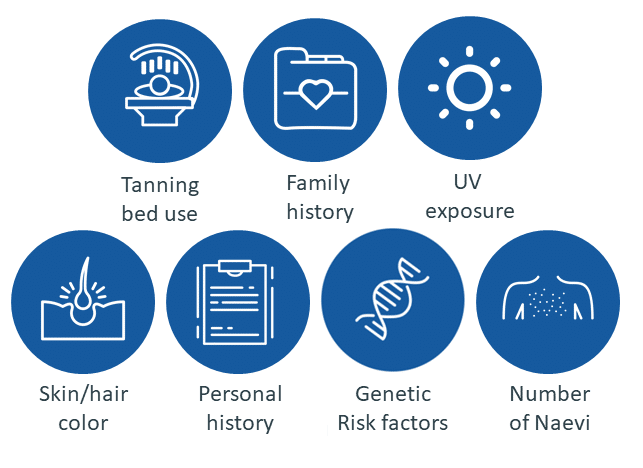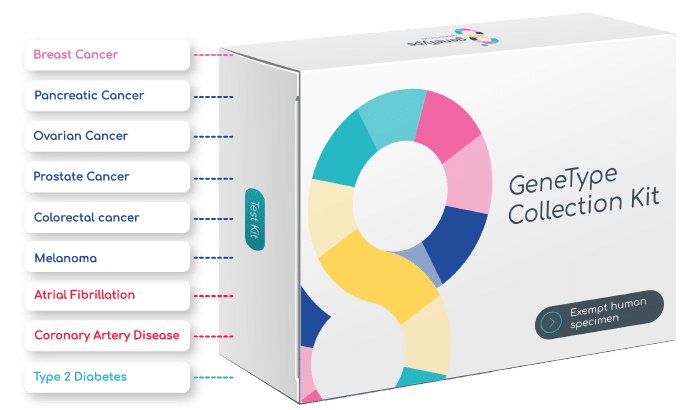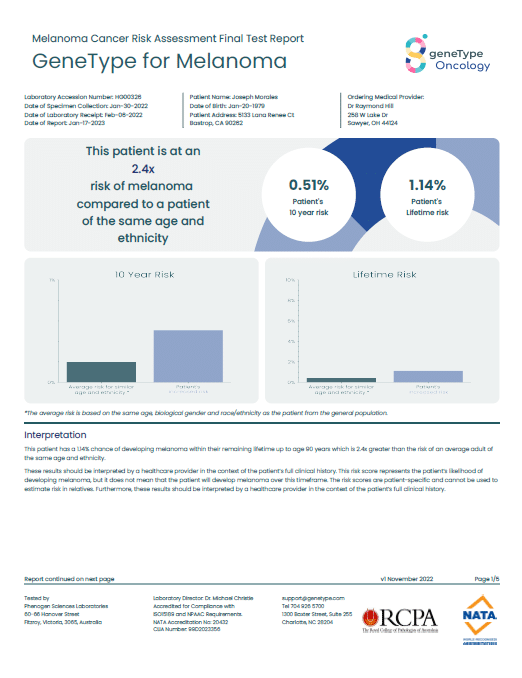Melanoma risk, could you be doing more for your patient?
Risk stratify your patient population.
Know their risk. Optimize their health plan.

Current skin screening recommendations take into account sun exposure and complexion.
When the choice to screen is left to joint-decision-making discussions…
Take a more personalized approach with geneType.
An integrated risk assessment.

Extend your conversations around
healthy skincare habits with geneType
Risk stratification can enable more informed decision-making discussion about individualized screening strategies.

Tailor risk reduction and screening recommendations for your patients
Whether you are discussing the impact of lifestyle habits on risk of melanoma, or you are strategizing about skin screening intervals, geneType opens the door to risk-reduction conversations with your patient.
Clinically Actionable Insights
GeneType reports are structured to make the results easy to interpret and communicate to a patient.
The GeneType for Melanoma report includes:
- Snapshot of your patient’s 10-year and lifetime-risk scores
- Interpretation of what their risk scores mean in the context of your local guidelines
- Polygenic risk score indicating your patient’s “baseline” melanoma risk
- Information about managing melanoma risk factors
- Types of screening and interventions that may be relevant to your patient’s risk category.
The geneType patient
GeneType for Melanoma is appropriate for:
- Adults
- Ages 30-85 years
- No known hereditary syndrome carriers e.g. CDKN2A

GeneType testing is simple

Step 1
Register as a provider; our team will provide clinical education and other resources as needed.
geneType will send kits to your clinic to have on hand.

Step 2
Discuss geneType with your patient.
Would geneType help them qualify for additional risk reduction strategies?

Step 3
Complete the Test Requisition form, collect a sample from the patient in the saliva tube provided and return both to geneType.
You will have the option to use a paper requisition, or a secure, compliant portal to complete the ordering process.

Step 4
Leave the rest to us.
geneType will notify you when your patient’s results are ready.
You will have the option to request a consult with a genetic counsellor, whether to review your patient’s results and/or to follow-up with your patient, as needed.
Do you have questions? We have answers.
If your question is not shown here, please contact us directly.
How old does my patient have to be to use this test?
GeneType for Melanoma is a melanoma risk assessment test for adults aged 30 years or older.
Can I order this test if my patient is a known carrier for a hereditary cancer syndrome (ie. CDKN2A)?
This test is not applicable to adults who have a personal history of melanoma or who have already been shown to have a cancer mutation, for example in the CDKN2A gene, or a diagnosis of a genetic syndrome that may be associated with elevated risk of melanoma.
Does this test incorporate all potential risk factors for melanoma?
Cancer is a multifactorial disease and there are many different risk factors. Of these, geneType integrates the most predictive risk factors into the model. Future models may include additional risk factors as the scientific community’s understanding of melanoma continues to evolve.
Is this test reimbursed by insurance?
No. At this time geneType is a self-pay test. However, your patient may use FSA/HSA to pay for the test.
What’s the difference between geneType and a liquid biopsy?
GeneType is a risk assessment tool to enable you to stratify your patient population.
Liquid biopsies, such as the Galleri test are novel, but pricey screening options.
A risk stratification tool can be used to identify your patients that might benefit from a novel screening tool like this one.

*Patient eligibility dependent on personal medical history, age and sex
Interested in ordering more than one disease? Order geneType Multi-Test.
See individual disease pages for more information about each test.
The Multi-Risk suite of tests is for adults 40-85 years of age. At maximum, a woman would be eligible for 8 diseases in the panel; a man would be eligible for 7. Starting at age 30, a patient may qualify for geneType's cancer risk assessments only.
Blog posts
GeneType Multi-Risk assessments tailored to your needs
It’s not always easy to know what questions to ask your Doctor. Here are some breast cancer risk questions…
Breast Cancer risk – Starting the conversation
It’s not always easy to know what questions to ask your Doctor. Here are some breast cancer risk questions…
Proactive steps for breast cancer risk reduction
Breast awareness is important whether you are 35 or 75. When you understand your risk, you can be a better advocate for yourself…
References
- American Cancer Society Melanoma Prevention. Available at: https://www.cancer.org/cancer/prostate-cancer/detection-diagnosis-staging/acs-recommendations.html. Accessed August 2023.
- Wong CK, Dite GS, Spaeth E, Murphy NM, Allman R. Melanoma risk prediction based on a polygenic risk score and clinical risk factors. Melanoma Res. 2023;33(4):293-299. doi:10.1097/CMR.0000000000000896








